Classification of employment agreements
The type of employment contract can be determined depending on the period during which such a document is valid.
They can be:
- urgent;
- temporary;
- concluded for an indefinite period (up to 5 years), provided that such a period is not regulated by federal legislation.
The most widespread is the one that involves imprisonment for an indefinite period.
Fixed-term contracts are drawn up in situations in which the employment relationship cannot exist for an indefinite period of time, as indicated by the nature of the work required to be performed, as well as the amount of effort that will be expended to complete the assigned tasks. Situations in which labor relations are urgent are indicated in Part 1 of Art. 59 Labor Code of the Russian Federation.
The performance of work duties can be continued even after the completion of the period established in them; if the parties to the agreement do not make demands for termination, and the employee continues to perform work functions, the agreements will be considered extended for an indefinite period.
It is impossible to determine the period during which the employee’s activities will be necessary for the employer, and also if there is such a need on an ongoing basis, contracts are concluded that do not contain a specific period of validity.
ARTICLE 4. RESPONSIBILITY OF THE PARTIES
4.1. In addition to the liability provided for by the current legislation of the Republic of Belarus for violation of the procedure and conditions of employment outside the Republic of Belarus or for illegal actions aimed at employing citizens abroad. The Agency is responsible for providing the Co-seeker with untrue information about the employer as part of the execution of this Agreement in the form of a fine paid by the Agency at a time in the amount of 2 (two) basic units. The Agency is exempt from paying a fine if it proves that such information was provided to it by the employer and the Agency did not know that the information provided by the employer was untrue. 4.2. The parties are released from liability for partial or complete failure to fulfill their obligations if they prove that such failure occurred as a result of force majeure circumstances, including: earthquake, fire, flood, that occurred after the signing of this Agreement, as well as instructions from competent government bodies limiting the legal capacity of any of the parties to fulfill the contract. A party that cannot fulfill its obligations under the contract as a result of the occurrence and operation of force majeure circumstances is obliged to notify the other party in writing of this within 5 (Five) calendar days from the moment the force majeure circumstances occur. 4.3. The Agency does not bear any responsibility for the early termination of the concluded employment contract between the Job Seeker and the employer, regardless of the grounds and initiative for its termination. 4.4. All disputes arising from the legal relationship between the Job Seeker and the Employer are resolved with the participation and assistance of the Agency.
When is it compiled?
Along with the conclusion of contracts on the performance of labor functions, the employer fills out work books. The employee must present such a document when hired.
In the absence of a work book, the following workers can be employed:
- taken for the first time;
- those who have lost the document (including due to its unsuitability) and are taking measures to restore it;
- who have entered into a civil agreement between the employer and the employee.
Sample civil contract:
Page 1

Page 2

Page 3
Employment contract without entry into the work book with a remote worker
Remote work is work that is performed outside the territory of the employer (any unit, any facility controlled by the employer), and communication via the Internet is used to complete the work and discuss work issues with the manager. If an employee gets a job with such conditions, then information about it may not be entered in the work book. In this case, if a record of work is not made, the main document confirming the fact of work and the employee’s length of service will be the employment contract for remote work. Thus, when working remotely, an employment contract can be drawn up without being recorded in the work book.
Do not confuse traveling work with remote work. The criteria for remote work are the following indicators: work is carried out outside the territory of the company, any of its branches, including those located in another area, but on the territory of Russia. The traveling nature of the activity implies frequent travel for work, but a personal connection with the employer.
Does the form have legal force?
The concept of working relationships is defined in Art. 15 Labor Code of the Russian Federation. As such, we understand relationships in which the parties are the employee and the employer, for the purpose of performing certain functions by the employed person, with his subordination to the internal working order, as well as the creation by the employer of such working conditions as determined by the legislator or the provisions of the employment contract.
Almost all the conditions that are fixed are determined by law. The parties do not have the right to change them, except in cases where such changes improve the situation of the participants.
In situations where an agreement implying the existence of civil legal relations is recognized by the court as one that regulates labor relations, labor law norms are applied to it.
The main task assigned to the legislator is to provide citizens who are participants in labor relations with the full range of guarantees stipulated by the Labor Code of the Russian Federation and other legislative acts regulating labor relations.
Nuances
| No work record | The provisions of the Labor Code of the Russian Federation indicate that when hiring an employee to the main place of work, making a corresponding entry in the work book is mandatory. The absence of such a document serves as the basis for its establishment within a five-day period. For persons who are part-time workers, entries in the employment record are not mandatory. Part-time workers cannot work for more than 4 hours on those days when they perform their functions at their main place of employment. On weekends, they can be hired to work part-time on a full-time basis. As a result, part-time work during the month should not exceed half of the monthly working time. |
| For individual entrepreneurs and LLCs | Citizens engaged in individual entrepreneurship have the right to employ individuals. To confirm employment, the parties enter into an agreement (contract), on the basis of which working conditions, required performance results and their payment are regulated. Concluding an agreement has a number of subtleties:
The conclusion of a rental agreement, the parties to which are the individual entrepreneur and an individual, allows you to determine the range of functions performed by the citizen, for the implementation of which remuneration will be paid by the individual entrepreneur. This type does not generate labor guarantees and benefits for employees established by the Labor Code of the Russian Federation. This means that additional payments (including bonuses) are provided to the employee solely at the request of the individual entrepreneur. At the same time, the individual entrepreneur does not pay insurance payments for the employee. |
| Between individuals | Individuals who do not have individual entrepreneur status do not have the right to make entries in work books. The performance of any work by individuals is formalized in the form of a written contract. Only those citizens who are entrepreneurs withhold and transfer taxes and insurance premiums specified in Art. 419 of the Tax Code of the Russian Federation. Personnel documentation for an employee is not drawn up only when employees carry out their activities on the basis of civil contracts that do not give rise to the emergence of labor relations. |
| Without registration | It is impossible to refuse employment to applicants on grounds that are not related to their professional qualities due to Art. 64 Labor Code of the Russian Federation. As such, we can consider the lack of registration and registration data. In this regard, refusal of employment to a person who has a residence permit in another city is not allowed. Many employers violate this provision. Upon receipt of a refusal to hire, a candidate for a position may request from the employer a written justification for his decision. If such a document is available, the received refusal can be appealed. |

What is the difference between a employment contract and an employment contract?
Recently, employers have begun to more often employ employees under an employment contract rather than under an employment contract. Workers, in turn, began to feel less protected. The absence of an entry in the employment record raises doubts about the employer and does not give confidence in the future. When an employment contract is concluded without a work book, such relationships can hardly be called working.
The main difference between such a contract and an employment contract is that these documents are regulated by different laws. The employment contract is the Labor Code, while the employment contract is the Civil Code of the Russian Federation. Both documents have legal force.
Many people worry about pension contributions, that if an entry is not made in the work book, then there will be no pension. The employer undertakes to make pension contributions under any terms of the contract. This is a mandatory clause; without it, employment will be illegal.
Why employers prefer this type of contract:
Lease agreement
- Place of work, materials and daily routine are established by agreement with the employee
- There is no need to pay social tax for the employee
- There is no need to pay the employee for sick leave and vacation
- You may miss out on bonus points
- It is possible to be exempt from contributions to the employee’s social insurance
However, not everything is so smooth for the employer; there are also disadvantages:
- The employer does not have the right to punish the performer of the work for violating the regulations.
- The contractor has the right to recognize the employment contract through the court as labor
- The tenancy agreement assumes equality of the parties. And they are called “Contractor” and “Customer”
- It is impossible to bring an employee to administrative liability with a contract of employment
As for the employee, there are still disadvantages for him that are provided for by the Labor Code of the Russian Federation, but are not mentioned in the Civil Code. These include:
- There is no provision for vacation paid by the employer.
- The contract is concluded for a certain period, after which the employer has the right to remove the contractor from business. Also, the employer unilaterally has the right to terminate the contract at any time without warning.
- When going on maternity leave, an employee will not receive benefits.
- If an employee does not submit work on time, the employer has the right to deprive him of his salary.
- If you are injured at work, the employer is not liable. There will be no payments. Moreover, sick leave will not be paid either.
- There will be no additional payments beyond what is specified in the contract.
- No benefits will be paid upon termination.
- Experience is not taken into account.
For these reasons, workers do not seek to get a job under such an agreement. With a full social package, there is confidence that one day the employee will not be left without work and a penny in his pocket. The employment agreement is aimed at providing the employee with activities, and the employment agreement is aimed at obtaining the result of the performer’s work.
Taxes and fees
The obligations imposed on the entrepreneur to make insurance contributions for hired employees continue to exist. The tax office collects such transfers.
The employer must pay for each employee:
- Personal income tax (rate 13 or 30%);
- contributions to the Pension Fund;
- contribution for medical and social insurance associated with the loss of the employee’s ability to work while performing work.
Agreement between individuals
In some cases, there is a moment when work will be performed by an individual for an individual. The law does not prohibit the conclusion of documents of this kind. Most often, employees encounter this type of contract when working temporarily or casually. The document must indicate exact numbers: the date and duration of the agreement.
In the case where the contract is concluded by individuals, then it must be registered with the executive committee.
As much contact information as possible between the customer and the contractor should also be indicated. This is necessary so that if something happens, you can find an employee or employer.
To protect yourself on the part of the employee, it is necessary to enter into an agreement with a legal entity. Then, in the event of a conflict situation, it will be easier to achieve justice. A contract for the performance of work between individuals is least protected from the legal side. Because everyone is responsible for themselves.
Pros and cons of working without a work book
Carrying out employment, formalized in the form of a contract that does not require recording in the labor contract, has certain disadvantages and advantages for each party:
| Plus | Minus |
|
|
Sample employment contract for part-time work:

Page 1

Page 2

Page 3

Page 4

Page 5
Drawing up an employment contract, sample
A sample of the new contract (2021) is available by clicking the button:
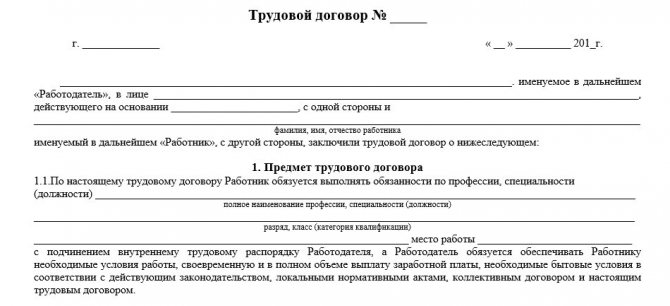
You can quickly and correctly draw up an employment contract by downloading this form in Word.
Note! It is not enough to fill out an employment contract correctly. A standard contract often needs to be adjusted taking into account the labor characteristics of a particular enterprise.
Registration of an employment contract consists of three stages.
Submission of documents
The employee provides the following documents to the HR department of the enterprise to conclude an employment contract:
- passport or other identity document;
- employment history;
- insurance certificate of state pension insurance;
- certificate of assignment of a taxpayer identification number (TIN);
- educational documents;
- military ID, military registration documents;
- medical insurance policy;
- medical certificate of the established form, health book.
If an employee enters an official place of work for the first time, the work book, state pension insurance certificate and TIN are issued by the employer (HR department).
How to draw up an employment contract with an employee
There is no single sample employment contract. Each employer, in accordance with the norms and requirements of the Labor Code of the Russian Federation, develops its own employment contract form. There are generally accepted rules on how to correctly draw up an employment contract.
The document is in written form in Russian; in constituent entities of the Russian Federation where the language of the indigenous population is widespread, there may be a translation; in the case of an international partnership – additionally in one of the foreign languages.
The employment contract is concluded in at least two copies: after both parties have signed the document, one copy is given to the employee, and the second is kept by the employer in the human resources department.
Contents of the employment contract, based on Art. 57 of the Labor Code of the Russian Federation, must include the following mandatory conditions:
- full name of the enterprise (organization), legal address, OGRN (main state registration number) - for an organization or OGRNIP - for an individual entrepreneur;
- Full name of the employee, date of birth, registration and residence address;
- The position for which the employee is hired, the job responsibilities associated with it, and the place of work are also best indicated in the employment contract.
- work start date;
- responsibilities and rights of the employee; if he undergoes training at the employer’s expense, he may be required to work for a certain period of time after completing his studies;
- rights and obligations of the employer;
- labor discipline: work schedule, working hours and rest hours, breaks, vacation periods, as well as requirements for appearance in the workplace, wearing work clothes and uniforms;
- description of working conditions, characteristics of the workplace;
- salary;
- probationary period (if provided by the employer): duration, daily working hours for the internship period; paid or not paid;
- type of employment contract - fixed-term (for what period) or indefinite, simple or with important annexes;
- types of social insurance;
- Details of the employee and the company, signatures of both parties, seal of the organization.
Working conditions can be changed and included in the employment contract by mutual consent of both parties.
If an entrepreneur unilaterally makes changes to an employment agreement regarding working conditions, he is obliged to notify the employee no later than 14 calendar days before they enter into force.
In case of changes in legislation, it is not necessary to conclude a new version of the employment contract. All you need to do is draw up and sign an additional agreement.
Employment contract with trade secrets and financial liability
The specifics of work activity in some cases require the introduction of special conditions into the agreement between the employee and his employer. Conditions that fall into this category include:
- With a trade secret. Involves consent to non-disclosure by the employee (at the request of the employer) of information. The trade secret regime is notified in writing.
- With financial responsibility. Most often, this condition is formalized in a separate document - an additional agreement.
Trade secret agreement, example:
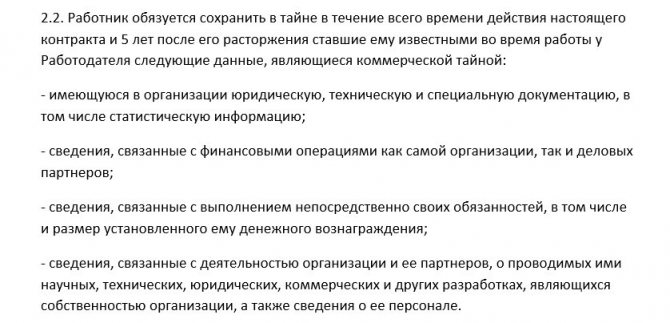
Appendix to the contract with full financial liability:
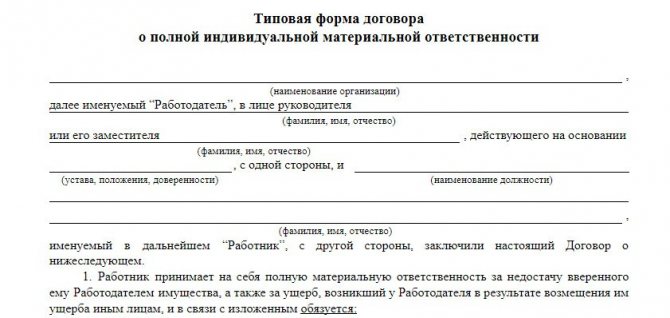
Indefinite and fixed-term employment contracts: main differences
The Russian Labor Code provides for the following types of labor agreements:
- Indefinite employment contract. Imprisoned for a term of more than 5 years. An agreement will be considered indefinite even if the term is not specified in it.
- Urgent. They are drawn up for a certain period, but not more than 5 years. Extension of the contract for a new period may be necessary if the full scope of work has not been completed during the specified period.
- Temporary. To perform certain work, for example, repair, seasonal, public works, maintenance services.
- A contract or employment agreement is a type of fixed-term employment contract, where the employer prescribes often strict, uncompromising conditions to achieve a certain goal (once it is achieved, the term of the agreement ends); common in the armed forces, paramilitary units, and show business. A sample contract is available at this link.
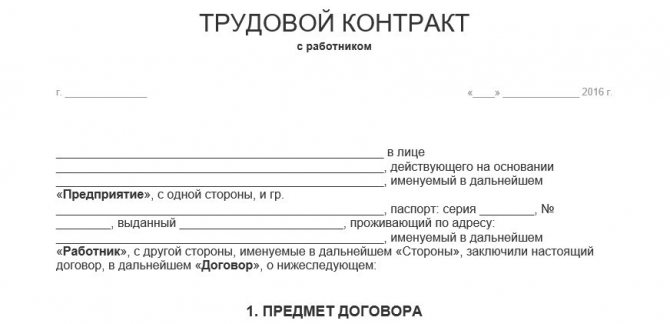
An employment contract for an indefinite period is the simplest and most common type of formalization of employment relations.
Employment contract for a probationary period
A probationary period is the period of a candidate’s tenure in a position in order to master the specifics of the job and acquire the missing knowledge and skills. During the internship, a potential employee will be able to understand whether the working conditions are suitable for him. And the employer will evaluate the candidate’s qualifications, compliance with professional standards and prospects.
The labor legislation of Russia regulates the following testing periods in the workplace:
- for most specialties and positions – cannot exceed three months (the specific period of up to three months is determined by the employer);
- for chief accountants, managers and their deputies – no more than six months.
The period of illness or absence of an employee from the workplace is not counted in the probationary period.
If the employer is not satisfied with the candidate, he is obliged to notify him no later than 3 days before the end of the internship of his professional unsuitability for work in this position. At the initiative of one of the parties, an employment contract with a probationary period may be terminated even before the end of the probationary period.
It is prohibited to subject the following persons to a probationary period when hiring:
- minor workers,
- pregnant women,
- mothers with children under the age of one and a half years,
- first time applicant applying for work,
- employee on transfer from another place of work,
- employees hired for a period of up to two months, etc.
If an employee is employed under a fixed-term employment contract for a period of two to six months, the probationary period cannot exceed two weeks. The employment contract for the probationary period must also establish payment for the internship period.
If the document does not contain instructions on preliminary testing, it is considered that the employee was hired without a probationary period.
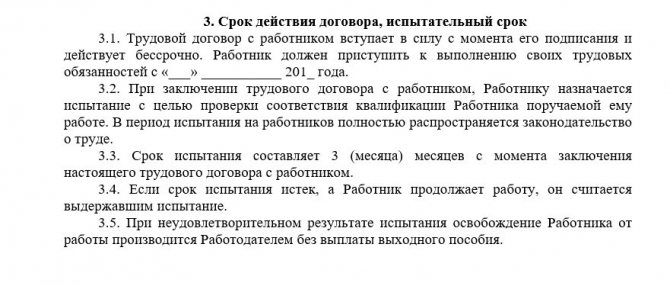
Civil employment contract
This type of labor agreement, unlike an employment contract, is regulated not by the Labor Code, but by civil law. A civil contract is concluded both with an employee of an enterprise and with a person who is not in an employment relationship with this organization.
The difference is that a standard employment contract specifies the employee’s wages for the process of his work, while a civil contract establishes payment for the result of work.
Under a civil law contract, an employee does not have any social benefits (except for voluntary social insurance) - vacation, sick leave, compensation for damage as a result of an injury at work, etc.
The employee completed his work within the period specified in the contract, received payment for the result that satisfied the customer, and is free.
Such an employee is not obliged to obey the discipline or schedule of the enterprise. He has his own individual work schedule specified in the contract. At the same time, the employer does not bear any responsibility for all kinds of risks and their consequences.
There are the following types of civil law contracts: contract for the provision of services, transportation, hiring.
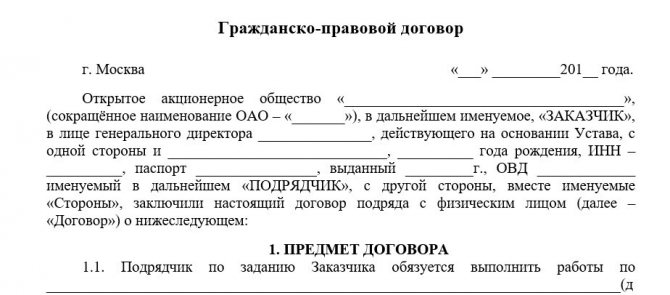
Collective labor agreement
A collective labor agreement is a type of agreement that is concluded between the employer and the representative body of the workforce (trade union, union of team members elected by employees). Such an agreement is intended to regulate production, socio-economic relations between the employer and the collective of workers, protect the interests of each party, and find compromise solutions in disputes and conflicts.
Such an agreement is concluded at enterprises of any form of ownership where hired labor is used. It is the collective labor agreement :
- explains in detail the rights and obligations of the employee and the employer;
- specifies the work schedule, work and rest schedule (including the duration of annual paid leave, unpaid leave, etc.), individual work schedule for employees combining work with training, advanced training courses;
- establishes wages and the likelihood of its increase, as well as bonuses, compensation, additional payments, etc.;
- describes in detail possible benefits for workers (for example, free delivery to homes, meals at the expense of the employer, health vouchers for large families, etc.);
- considers labor protection conditions;
- standardizes the provision of medical care, health improvement, living space for employees at the expense of the employer, etc.
This local regulatory document cannot prescribe conditions that worsen the position and working conditions of workers in comparison with the regulated conditions of the Labor Code of the Russian Federation.
The collective labor agreement is registered with the regional branch of the Ministry of Labor of the Russian Federation within seven days after signing by both parties. It comes into force from the day it is signed by all members of the workforce and the employer or from the date established in it. Such a document is concluded for a period of 1 to 3 years; upon expiration of the period, it can be extended for a similar period, subject to the consent of both parties.
There are fines for violation and failure to fulfill the obligations of the collective agreement.
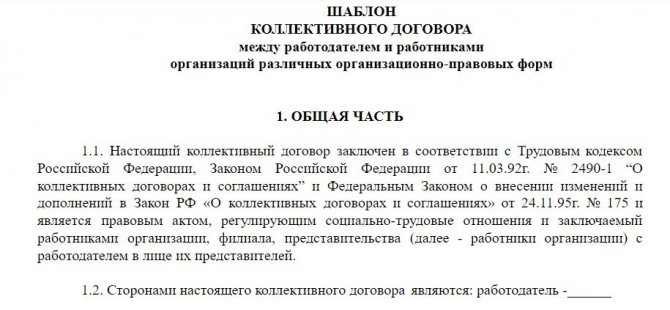
Fixed-term contract for seasonal work
The duration of seasonal work cannot exceed 6 months. A short-term employment contract with a seasonal worker is concluded according to general rules.
Such an agreement must indicate the seasonal nature of the work. The probationary period for seasonal employment should not exceed two weeks. This type of work provides paid leave according to the standard scheme - 2 calendar days for each month worked.
In case of early dismissal (at his own request, for health reasons or for other reasons), the seasonal employee is obliged to inform about his decision in writing at least 3 calendar days before leaving.
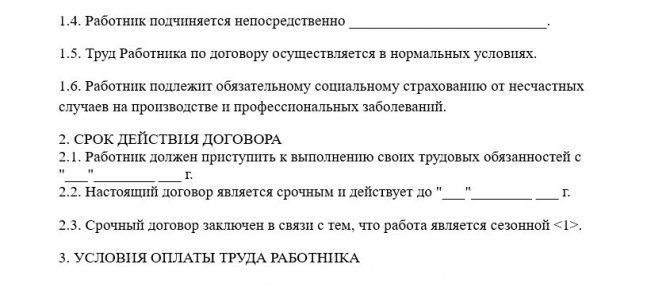
Employment contract without official employment
In the case of work without drawing up a work book - under an employment contract without employment (civil employment contract) - the employer does not bear any financial liability in the event of an industrial injury, illness of an employee, damage to his work tools, uniform, etc.
The employer's obligation is limited only to monthly contributions to the Russian Pension Fund and to the compulsory health insurance fund. In other labor aspects, the customer is free in his actions. This position of management is beneficial and typical for micro-enterprises: an employment contract without formalizing employees reduces the company’s expenses on taxes and standard social benefits for the employee.
Russian legislation allows employment without an entry in the work book, but with the conclusion of an employment contract. This applies to the following types of contracts:
- author's employment contract without official employment: a person performs one-time creative work (for example, creating an interior design, melodies for a song, etc.);
- contract: performance of repair and construction services by an employee;
- agency agreement: short-term employment of an employee to perform a specific task.
The legal framework provides for work under an employment contract without issuing a work book in the case of part-time employment (the work book is issued at the employee’s main place of employment).
Like a standard employment contract, an employment agreement without a work book must contain clearly defined rights and obligations of the employee, deadlines for completing the work, the amount of payment based on the results of the work, as well as possible fines for violating the contract.
A sample civil contract can be downloaded above.
Sample agreement for a part-time worker:
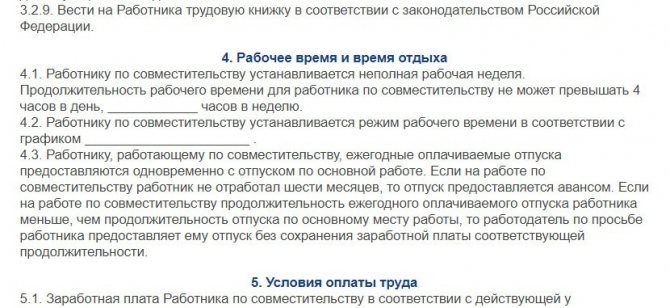
Free employment contract
According to Russian legislation, an individual (including an entrepreneur) and a legal entity of any form of ownership, on their own initiative, has the right to provide services without payment - on a gratuitous basis. If you have such a desire and opportunity, you need to draw up a gratuitous employment contract.
In form, such an employment agreement does not differ from a standard paid employment contract. The content is especially in that it necessarily has a clause on the gratuitousness of the work and a detailed description of the free service provided.
Download document
Employment contract with a minor employee
Typically, persons over 18 years of age are officially employed. The Labor Code of the Russian Federation prohibits the use of the labor of minors under 14 years of age, otherwise the employer will face administrative and criminal liability.
An exception is the participation of a minor child under the age of 14, with the consent of one of the parents (adoptive parents, guardians, trustees), in the creation and interpretation of works of theater, cinema, circus performances and concert shows.
An individual can enter into an employment contract from the age of 16, if his work duties are not included in the list of works that only persons who have reached the age of majority are allowed to perform.
It is prohibited to use the labor of minors aged 14 to 18 years in the following areas:
- dangerous, harmful production,
- underground works,
- gambling business and entertainment establishments,
- production of alcohol and tobacco products, toxic substances and narcotic drugs.
Persons who have reached the age of 14 years can be hired only with the consent of at least one of the parents (adoptive parents, guardians, trustees). At the same time, such an employee is burdened with exclusively light work without harm to health and performs his duties in his free time from study (correspondence course).
The employment of a 15-year-old worker should not prevent him from obtaining a certificate of complete secondary education.
For an employee aged 14 to 15 years, the working day is 2.5 hours and the working week is 12.5 hours. A minor employee between 15 and 16 years of age must work no more than 5 hours a day and 24 hours a week. For workers aged 16 to 18 years, the following regime is established: a maximum of 7 hours a day and 35 hours a week.
A minor employee is required to take a break and pay an annual leave of 31 calendar days.
An employer does not have the right to issue a power of attorney to an employee aged 14 to 18 years to carry out operations related to making a profit, since a minor does not have full legal capacity.
In this case, the minor employee is responsible for his actions in relation to his work duties. In case of systematic violation of labor discipline (absenteeism, tardiness), negligent attitude towards one’s labor duties, the employer has the right to terminate the employment contract with a minor employee unilaterally.
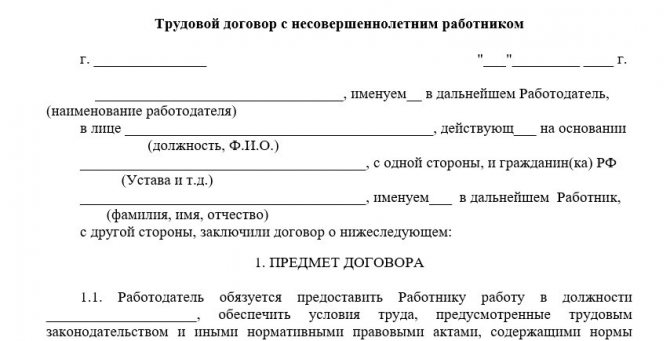
Employment contract with training pay
If an employee has undergone vocational training at the expense of the company, the employer has the right to stipulate in the employment contract with the young specialist the obligation to work for a certain period of time after training at the enterprise.
Including such an obligation for an employee in an employment agreement is legal if it also states the employer’s obligation to pay for this training.
If an employee is dismissed at his own request without a good reason before the expiration of the established period of service, financial liability arises. The employee will have to reimburse the employer for the funds spent on his training.
The amount of debt is calculated in proportion to the actual time not worked after completion of training: the employee must reimburse expenses only for the period that remains before the deadline for completing work.
An employment contract with training pay must indicate unjustified reasons for dismissal. Or draw up a separate annex to the contract, which will indicate these reasons.
The employer does not have the right to demand reimbursement of training costs for an employee in the event of his early dismissal at his own request, if the employee combined work and study.
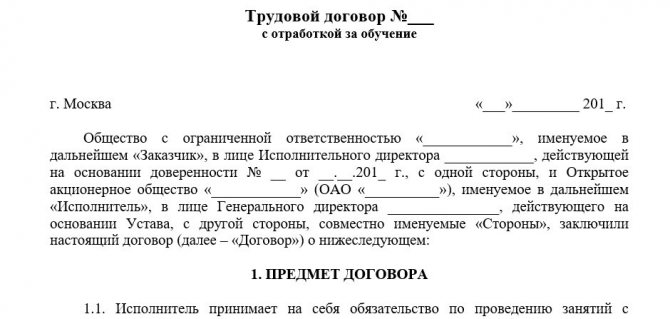
Differences from a regular employment contract
Subjects of labor relations are not always able to determine for themselves the most acceptable form of contract within the framework of which labor activities will be carried out. You can decide on the type of template to be concluded by determining the most important characteristics of the future relationship.
Civil contracts have significant differences from employment contracts:
| Characteristics | Civil law | Labor |
| Parties | Performer, customer | The employee is a citizen, the employer is a business entity |
| Validity | Limited by duration of service provision | uncertain |
| Experience | Not recorded in labor records | Entered into the labor record |
| Executor | Performs work, including with the help of third parties | Performs the range of job responsibilities specified in the contract and job descriptions |
| Payment | The full price for fully completed work is agreed upon. The calculation procedure is determined by the parties | The salary is established by agreement and staffing schedule. The calculation is performed twice a month. Accrual is carried out in accordance with the wage system |
| Working conditions | Not provided | Provided |
| Social guarantees | Not provided | Provided in accordance with the law |
| Tax obligations | Insurance premiums are not charged or paid | Personal income tax, salary taxes and insurance contributions are transferred |
| Responsibility for quality indicators arising from the performer | Violation of the terms of the contract may result in penalties | Possible disciplinary action |
ARTICLE 1. SUBJECT AND CONDITIONS OF THE AGREEMENT
1.1. The Applicant instructs, and the Agency undertakes, obligations related to providing assistance to the Applicant in finding a job and his employment in the Republic of Poland, in accordance with his wishes and qualifications, taking into account his profession (specialty). 1.2. The Agency does not collect any payment from the Applicant under this Agreement.
1.2. APPLICANT CONDITIONS:
1.2.1. Country of intended place of work: Republic of Poland; 1.2.2. Main profession (diploma, work experience): _______________________________________ ________________________________________________________________________________ 1.2.3. Minimum wage: hourly rate___________________________ 1.2.4. Duration of the employment agreement (contract): _______________. 1.2.5. The Applicant pays for travel to the country of employment and back to the Republic of Belarus independently. 1.2.6. Living conditions: hostel or other place of residence at the expense of the employer. 1.2.7. Health insurance: compulsory health insurance is provided by the employer, additional insurance is provided at the expense of the employee.
1.3. DUTIES OF THE PARTIES:
1.3.1. In order to successfully implement this Agreement, the Agency undertakes to conduct preliminary negotiations with the employer on the Candidate's candidacy, to provide him (the Applicant) with offers to work in the Republic of Poland, based on his wishes as set out in paragraph 2 of Article 1 of this Agreement , 1.3.2. If the Applicant approves the proposed vacancy, the Agency undertakes to ensure the conclusion of an employment contract between the Applicant and the employer, register the employment contract in the citizenship and migration department and hand it over to the Applicant before leaving for the Republic of Poland.
Employer Responsibilities
The employer, acting as a party to the labor relationship, bears a number of obligations, failure to fulfill which may become a reason for the application of liability measures.
Upon conclusion, the employer is assigned responsibilities for:
- compliance with labor legislation and the terms of the concluded contract;
- creating safe working conditions;
- providing workers with the required documentation, materials, tools, etc.;
- payment of wages;
- consideration of collective complaints, elimination of violations of the provisions of employment contracts;
- social insurance;
- providing material compensation;
- providing time for rest;
- conclusion, communication to employees and fulfillment of requirements.
Customers are obliged to accept the results of the work performed and pay for them in accordance with the conditions reached by the parties.







